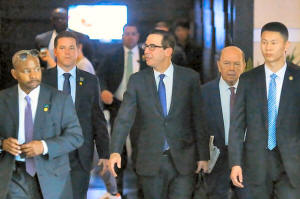|
China state media sees positives in trade
talks with U.S.
 Send a link to a friend
Send a link to a friend
 [May 05, 2018]
BEIJING (Reuters) - Chinese state
media struck an optimistic note on trade talks between Chinese and U.S.
officials after U.S. President Donald Trump threatened to impose tariffs
on up to $150 billion in Chinese goods over allegations of intellectual
property theft. [May 05, 2018]
BEIJING (Reuters) - Chinese state
media struck an optimistic note on trade talks between Chinese and U.S.
officials after U.S. President Donald Trump threatened to impose tariffs
on up to $150 billion in Chinese goods over allegations of intellectual
property theft.
The English-language China Daily saw a “positive development” in the two
days of talks in an agreement to establish a mechanism to keep the
dialogue open, despite “big differences”, as part an effort to resolve
trade disputes.
The newspaper said the biggest achievement was “the constructive
agreement between Beijing and Washington to keep discussing contentious
trade issues, instead of continuing the two-way barrage of tariffs,
which pretty much brought the two countries to the brink of a trade
war”.
The People’s Daily said the talks “laid solid foundation for further
talks on trade and economic cooperation, and for ultimately achieving
benefits (to both countries) and win-win results”.

China's state-run Xinhua news agency described the talks as
"constructive, candid and efficient" but with disagreements that remain
"relatively big".
People familiar with the talks said on Friday the Trump administration
had drawn a hard line, demanding a $200 billion cut in the Chinese trade
surplus with the United States, sharply lower tariffs and advanced
technology subsidies.
The lengthy list of demands was presented to Beijing before the start of
talks on Thursday and Friday to try to avert a damaging trade war
between the world's two largest economies.
A White House statement issued on Friday said the U.S. delegation, led
by Treasury Secretary Steven Mnuchin, “held frank discussions with
Chinese officials on rebalancing the United States–China bilateral
economic relationship, improving China’s protection of intellectual
property, and identifying policies that unfairly enforce technology
transfers”.
The statement gave no indication that Trump would back off on his threat
to impose tariffs.
[to top of second column]
|


Capital Economics, a private economic research consultancy based in
London, said in a research note that demands made by the United
States were so "unrealistically high" that an agreement was unlikely
this week.
"Unless the Trump administration settles for a lot less
than initially demanded, tensions between the two countries will
continue for some time," it said.
But "both the U.S. and China have shown some willingness to
compromise", it said. "Given that the U.S. entered into the
negotiations with a list of unrealistically high demands... it is
reassuring that the talks didn’t break down altogether."
The U.S. delegation was returning to Washington to brief Trump and
"seek his decision on next steps", the White House said, adding that
the administration had "consensus" for "immediate attention" to
change the U.S-China trade and investment relationship.
Trump said he would meet the delegation on Saturday.
"We will be meeting tomorrow to determine the results, but it is
hard for China in that they have become very spoiled with U.S. trade
wins!" he said in a Twitter post late on Friday.
(Reporting By Norihiko Shirouzu and Pei Li; Editing by Nick Macfie)
[© 2018 Thomson Reuters. All rights
reserved.]
Copyright 2018 Reuters. All rights reserved. This material may not be published,
broadcast, rewritten or redistributed.
Thompson Reuters is solely responsible for this content.

 |